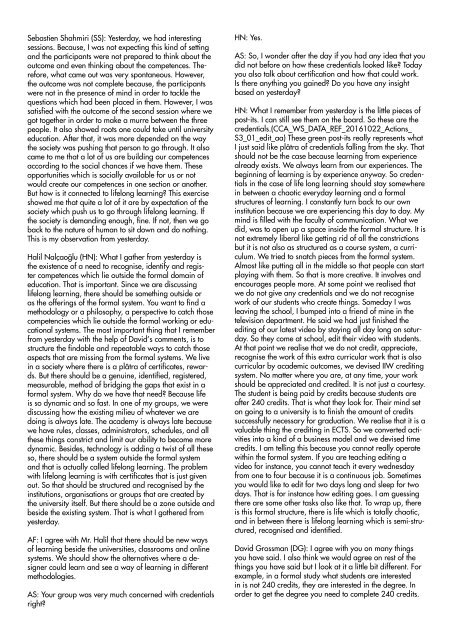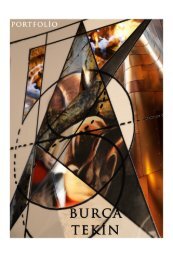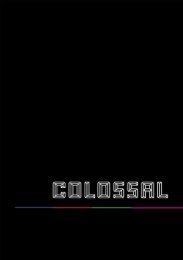BURCA TEKİN - 11535024 -
You also want an ePaper? Increase the reach of your titles
YUMPU automatically turns print PDFs into web optimized ePapers that Google loves.
Sebastien Shahmiri (SS): Yesterday, we had interesting<br />
sessions. Because, I was not expecting this kind of setting<br />
and the participants were not prepared to think about the<br />
outcome and even thinking about the competences. Therefore,<br />
what came out was very spontaneous. However,<br />
the outcome was not complete because, the participants<br />
were not in the presence of mind in order to tackle the<br />
questions which had been placed in them. However, I was<br />
satisfied with the outcome of the second session where we<br />
got together in order to make a murre between the three<br />
people. It also showed roots one could take until university<br />
education. After that, it was more depended on the way<br />
the society was pushing that person to go through. It also<br />
came to me that a lot of us are building our competences<br />
according to the social chances if we have them. These<br />
opportunities which is socially available for us or not<br />
would create our competences in one section or another.<br />
But how is it connected to lifelong learning? This exercise<br />
showed me that quite a lot of it are by expectation of the<br />
society which push us to go through lifelong learning. If<br />
the society is demanding enough, fine. If not, then we go<br />
back to the nature of human to sit down and do nothing.<br />
This is my observation from yesterday.<br />
Halil Nalçaoğlu (HN): What I gather from yesterday is<br />
the existence of a need to recognise, identify and register<br />
competences which lie outside the formal domain of<br />
education. That is important. Since we are discussing<br />
lifelong learning, there should be something outside or<br />
as the offerings of the formal system. You want to find a<br />
methodology or a philosophy, a perspective to catch those<br />
competencies which lie outside the formal working or educational<br />
systems. The most important thing that I remember<br />
from yesterday with the help of David’s comments, is to<br />
structure the findable and repeatable ways to catch those<br />
aspects that are missing from the formal systems. We live<br />
in a society where there is a plâtra of certificates, rewards.<br />
But there should be a genuine, identified, registered,<br />
measurable, method of bridging the gaps that exist in a<br />
formal system. Why do we have that need? Because life<br />
is so dynamic and so fast. In one of my groups, we were<br />
discussing how the existing milieu of whatever we are<br />
doing is always late. The academy is always late because<br />
we have rules, classes, administrators, schedules, and all<br />
these things constrict and limit our ability to become more<br />
dynamic. Besides, technology is adding a twist of all these<br />
so, there should be a system outside the formal system<br />
and that is actually called lifelong learning. The problem<br />
with lifelong learning is with certificates that is just given<br />
out. So that should be structured and recognised by the<br />
institutions, organisations or groups that are created by<br />
the university itself. But there should be a zone outside and<br />
beside the existing system. That is what I gathered from<br />
yesterday.<br />
AF: I agree with Mr. Halil that there should be new ways<br />
of learning beside the universities, classrooms and online<br />
systems. We should show the alternatives where a designer<br />
could learn and see a way of learning in different<br />
methodologies.<br />
AS: Your group was very much concerned with credentials<br />
right?<br />
HN: Yes.<br />
AS: So, I wonder after the day if you had any idea that you<br />
did not before on how these credentials looked like? Today<br />
you also talk about certification and how that could work.<br />
Is there anything you gained? Do you have any insight<br />
based on yesterday?<br />
HN: What I remember from yesterday is the little pieces of<br />
post-its. I can still see them on the board. So these are the<br />
credentials.(CCA_WS_DATA_REF_20161022_Actions_<br />
S3_01_edit_aa) These green post-its really represents what<br />
I just said like plâtra of credentials falling from the sky. That<br />
should not be the case because learning from experience<br />
already exists. We always learn from our experiences. The<br />
beginning of learning is by experience anyway. So credentials<br />
in the case of life long learning should stay somewhere<br />
in between a chaotic everyday learning and a formal<br />
structures of learning. I constantly turn back to our own<br />
institution because we are experiencing this day to day. My<br />
mind is filled with the faculty of communication. What we<br />
did, was to open up a space inside the formal structure. It is<br />
not extremely liberal like getting rid of all the constrictions<br />
but it is not also as structured as a course system, a curriculum.<br />
We tried to snatch pieces from the formal system.<br />
Almost like putting all in the middle so that people can start<br />
playing with them. So that is more creative. It involves and<br />
encourages people more. At some point we realised that<br />
we do not give any credentials and we do not recognise<br />
work of our students who create things. Someday I was<br />
leaving the school, I bumped into a friend of mine in the<br />
television department. He said we had just finished the<br />
editing of our latest video by staying all day long on saturday.<br />
So they come at school, edit their video with students.<br />
At that point we realise that we do not credit, appreciate,<br />
recognise the work of this extra curricular work that is also<br />
curricular by academic outcomes, we devised IIW crediting<br />
system. No matter where you are, at any time, your work<br />
should be appreciated and credited. It is not just a courtesy.<br />
The student is being paid by credits because students are<br />
after 240 credits. That is what they look for. Their mind set<br />
on going to a university is to finish the amount of credits<br />
successfully necessary for graduation. We realise that it is a<br />
valuable thing the crediting in ECTS. So we converted activities<br />
into a kind of a business model and we devised time<br />
credits. I am telling this because you cannot really operate<br />
within the formal system. If you are teaching editing a<br />
video for instance, you cannot teach it every wednesday<br />
from one to four because it is a continuous job. Sometimes<br />
you would like to edit for two days long and sleep for two<br />
days. That is for instance how editing goes. I am guessing<br />
there are some other tasks also like that. To wrap up, there<br />
is this formal structure, there is life which is totally chaotic,<br />
and in between there is lifelong learning which is semi-structured,<br />
recognised and identified.<br />
David Grossman (DG): I agree with you on many things<br />
you have said. I also think we would agree on rest of the<br />
things you have said but I look at it a little bit different. For<br />
example, in a formal study what students are interested<br />
in is not 240 credits, they are interested in the degree. In<br />
order to get the degree you need to complete 240 credits.<br />
There is a difference there because if they had to have 246<br />
credits they would just be as interested in 240 credits. They<br />
are interested in fact in formal studies is this first big yellow<br />
one. Because in the beginning of our studies 90 percent of the<br />
time we go to formal framework of study.The way the world<br />
has developed the best way of knowing it is to make credits<br />
and grades. It is the way the world works and at a certain<br />
point we need a degree. When you get the degree, it is a<br />
recommendation, a recognition and people feel alright to<br />
take the next step. In terms of the formal universities, they are<br />
very good at making a first, second degree and so on, and<br />
handling all the rest of it. It sort of works. People have high<br />
motivation in investing more time because they understand the<br />
culture of the university that is good for them learning and it<br />
is also good as they get recognition. It is also good if they are<br />
in a faculty so they go up the ladder. It is a system where you<br />
play by the rules and it works. Then you go out into the world<br />
and you work. People usually without too much realisation<br />
know that they have to continue to expand because things are<br />
happening. So they do go to competences and they do participate<br />
in projects to learn by themselves. They do lots of things<br />
which is lifelong learning and there are some minor awards<br />
for it. I think what we are saying in the discussions we had<br />
yesterday is that in the competences we know that there is a<br />
lot that is worse learning. That is changing all the time especially<br />
in the world of design. If a designer wants to be current, it<br />
is a good idea that he continues to learn. That is not a difficult<br />
concept and I think everybody agrees upon that. I think from<br />
the activities section, we saw without too much discovery that<br />
there are many many options that can provide opportunities<br />
to learn. From more formal to less formal, more personal to<br />
less personal, intended to unintended structure. There are<br />
many opportunities to learn. The thing that is missing is something<br />
when we are in school, there is a very formal structure<br />
so you do what you told and hopefully you learn. When you<br />
go out into the world there is no really a structure if you are<br />
highly motivated and able. It is also a question of time, money<br />
and things like that so you learn by yourself but not only there<br />
is no structure that encourages you in an orderly way to learn,<br />
but unfortunately there is also for many people no frame<br />
of mind that automatically causes you to say you to learn.<br />
People who are lazy and do nothing. There is no motivation<br />
and there is nothing fostering it. That is what is missing. I think<br />
it is difficult because in a school the professors tells the student<br />
to come on tuesday to do his work. If he comes he does work<br />
if he does not he is out. In the world it is a personal thing in<br />
a competition. So I think on the one hand yesterday in terms<br />
of competences, I think it is possible to recognise a balloon of<br />
changing competences. It will change every time so, it always<br />
needs more things and there is a basket of things that are<br />
competences that a designer needs. A slightly different basket<br />
for architects, engineers, every profession has their basket. In<br />
terms of activities, there is also pretty understandable menu<br />
of opportunities for activities that permits you to learn. It is<br />
really a menu, you do not have to take one. You can take one<br />
from here two from there but what we are agreeing is that as<br />
long as we have some of them it is ok. But what is missing is<br />
to convince people that they have to do it number one and<br />
create some system that fosters that. I think that is the glue<br />
between the competences and the activities and I think that<br />
is the trick. That is what does not exist. How do we create a<br />
frame of mind so that a professional understands<br />
I should be doing something on the menu of lifelong<br />
learning. But if I do not do it then the other guys are<br />
doing it so he is going to be better than me. I think that<br />
should be planted in the schools which did not. I think<br />
it is an opportunity for schools to be more active after<br />
graduation. But it is not only the schools I think also the<br />
professional organisations, governments and individuals<br />
have a role to play. I think that our challenge is to<br />
suggest to that have a form, a brand, a societal imprint<br />
on it that people think that it is a right thing to do. It<br />
cannot be too formal because it should not be too formal.<br />
Because people have to think of it as a right thing<br />
to do so it is creating a behaviour pattern that is accepted.<br />
People learn how to drive and there are rules about<br />
driving and if you do not go according to the rules you<br />
get a ticket. But none of us are going according to the<br />
rules because we behave with the other cars. It is culture<br />
that you learn. It is this culture I think that we have to<br />
learn. That is the opportunity and that is the new thing<br />
that would change lifelong learning. To my mind I call<br />
that credentials. It is not so much of a credential in a<br />
stamp. It is more a credentials in individuals and society<br />
recognise that as the right thing to do. Just as you are<br />
polite, you do not get a badge on it but you can see<br />
when someone is polite. If someone is really interested<br />
in lifelong learning and you see him in a conference or<br />
a project he becomes interesting, he teaches all these<br />
things and he tells himself it is the right thing. I think<br />
that does not exist. It somehow creates a culture of<br />
activities between the formal education and the professional<br />
activities of individuals. I think that is what is<br />
most interesting so when you say when these things are<br />
meaningless certificates, I do not see them as meaningless<br />
but I see them as little stars of good behaviour that<br />
you value. How can we create a system that people<br />
recognise that these stars are a good thing. It is sort of<br />
a passport. Does not have to be a physical passport but<br />
if you look back over the past year you say what did I<br />
do this year to learn. Well I went to a conference and I<br />
did this so ok. And if I look back at my passport and it<br />
is empty, I say that this is not so good. More than that, if<br />
the professional association looks at his member and he<br />
says what did you do this year? Because when I came<br />
to this workshop I learned something for the last two<br />
days. I cannot help but learn when you have a meeting<br />
like this. That is a good thing. It is a question of creating<br />
this passport system in the mind. I think that would be a<br />
good outcome. I think that we agree but we look at it at<br />
different angles.<br />
HN: Totally.<br />
DG: Just between us in terms of the universities,<br />
it is a big opportunity. Because in this point, in<br />
most of the cases when the students leave for<br />
formal education, bye bye. But universities are<br />
in the best situation in terms of not only content<br />
and expertise, and research but also in terms of<br />
facilities. Your are in the best situation to create<br />
more formal necklace of events that people can<br />
voluntarily participate in that is good for you too.






